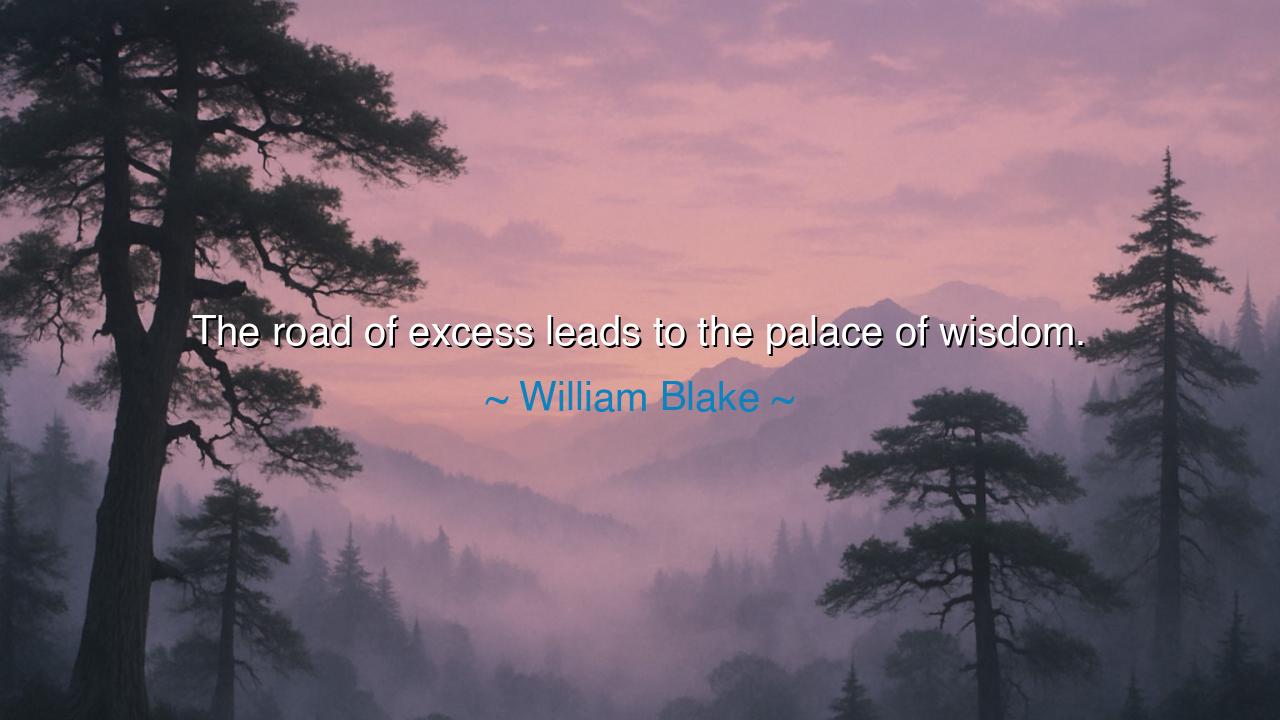
The road of excess leads to the palace of wisdom.






The mystic poet William Blake proclaimed, “The road of excess leads to the palace of wisdom.” These words, veiled in paradox, speak to the soul of man’s restless hunger. To walk the road of excess is to taste deeply of life’s extremes, to push against the limits of experience until one discovers their true edge. For Blake believed that in straying beyond moderation, a man may come to know the cost of his desires, and in knowing, be brought at last to wisdom.
The ancients too knew that restraint is not always the first teacher. Some lessons are carved into the heart only after indulgence has shown its emptiness. To drink deeply of excess is to find both its sweetness and its poison; to feast until one is sick is to understand the worth of temperance. Thus, the palace of wisdom is not reached by the cautious alone, but also by the wanderer who loses his way, suffers the weight of consequence, and returns with eyes opened to truth.
History gives us countless witnesses. Consider Augustine of Hippo, who in his youth chased pleasure and ambition without measure. He wandered through passions, through false philosophies, through the excess of worldly pursuit. Yet it was through this long road that he came at last to the blazing gates of faith and understanding. His Confessions testify that had he not strayed, he might never have known the depth of redemption. His wisdom was the palace built from the stones of his own excess.
But there is also a warning in Blake’s words. Not all who tread this path return. Some are consumed by the fire of indulgence, never reaching the palace, but perishing along the road. The lesson is not to glorify excess, but to acknowledge its power to reveal truth—truth that moderation alone may never expose. For one who has seen the edge of the abyss knows more of life’s gravity than one who has stood timidly at its center.
Let this wisdom be carried forward: there are two teachers in this world—discipline and excess. The first guards the soul from danger, the second burns it until it knows its own limits. Both, if endured, can lead to the palace where wisdom dwells. Yet let the seeker choose carefully, for the road of excess is long and perilous, and only the strong of spirit may return bearing treasure for the generations to come.






NTNguyen Trong
This quote makes me think about how often people seek to experience everything—pleasure, pain, freedom—before they truly understand life. Could Blake be suggesting that wisdom comes after we’ve fully experienced the extremes? But is this the best path, or are there other, less destructive ways to gain insight? Does it imply that living a balanced life, avoiding excess, might not lead to the same kind of deep wisdom?
NXNay Xurin
Blake’s perspective is intriguing, but it also raises questions about the consequences of excess. Is wisdom really about going through wild extremes, or could it simply be a lesson in moderation? What if the ‘road of excess’ refers to pushing boundaries in a broader sense—trying new things, taking risks, and challenging norms? But where do we draw the line between learning from excess and falling into unhealthy habits?
MHMinh Hieu
William Blake’s quote feels like a reflection on how we often have to experience things fully—both the good and bad—to really understand them. But doesn’t the road of excess also come with risks? Could the wisdom Blake refers to be more about self-awareness after realizing the consequences of excess? Is it possible to gain wisdom without needing to go through excess in the first place, or is there truly no shortcut?
KLTong Le Kim Lien
It’s interesting how Blake equates excess with the path to wisdom. But doesn’t excess often come with negative consequences? Can we truly learn wisdom from actions that seem reckless or self-destructive? Maybe Blake is referring to personal growth through trial and error, but can you really find wisdom in going too far, or is this just romanticizing indulgence? I’m curious to know how people interpret 'excess'—is it about overindulgence in pleasures or pushing limits?
DHPham Duc Huy
This quote really caught my attention. It almost feels like a paradox, right? How can excess, something often seen as harmful, lead to wisdom? Does Blake mean that we learn from the consequences of excess? Or maybe he’s suggesting that experiencing life in extremes teaches us valuable lessons? I wonder if the wisdom comes from the realization that moderation is key, after we’ve indulged too much in the 'excess' part of life.